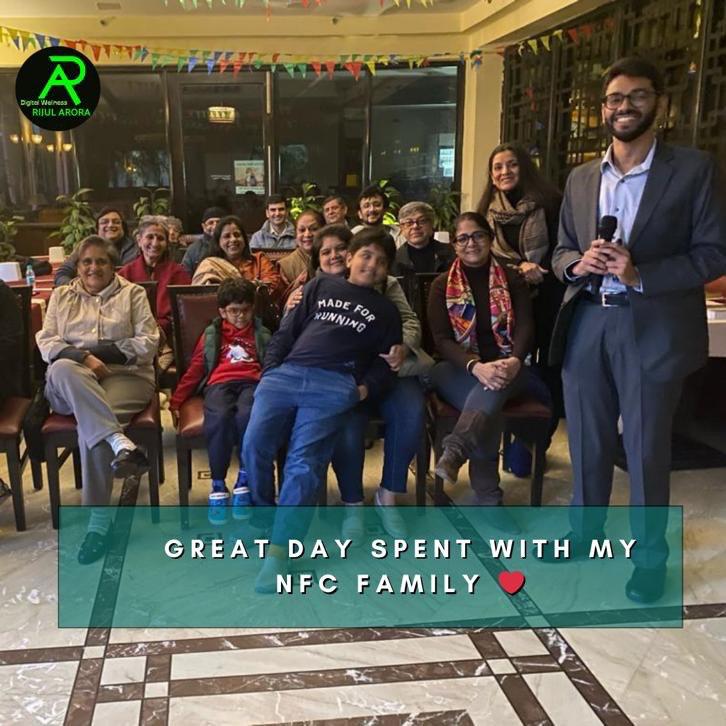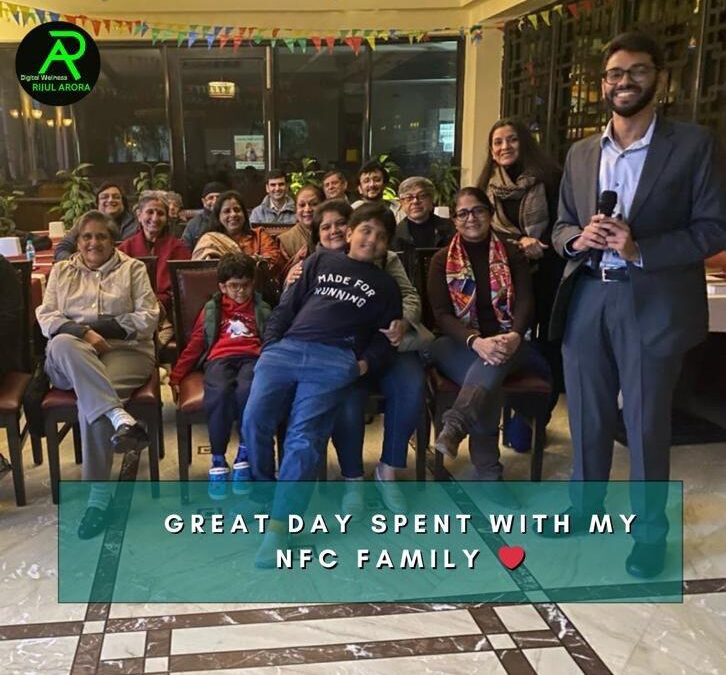Am sure all of us cannot deny that the world today is a “digital”. Every single minute of the day, there is involvement of a digital devicewhether it’s for news, entertainment, work, or communication. Haven’t we become conveniently accustomed to this unnatural state of constant connectivity? Gosh…..isn’t it funny that we find our ourselves reaching for our phones immediately upon waking up and do a last check of messages on that same device before hitting the bed!! In fact, we even have new terms like “FOMO” – the “FEAR of missing out – to describe what some individuals experience when they are away from their devices or social networks even for a short time.
It’s hard to remember what we did before our phones and laptops felt like an extension of ourselves and we shared our lives so publicly through social networks. So, it’s easy to lose sight of the negative impact of all this technology. That’s why NFC RWA (Ashoka Park) together with NFC Club requested Rijul Arora, one of our very own residents of the colony to help many understand the growing need and necessity of a ‘digital detox’ and the concept of “JOMO” – the “JOY of Missing Out”. Rijul explained that a digital detox is when a person refrains from using tech devices such as smartphones, televisions, computers, tablets, and social media sites. The purpose is often seen as a way to focus on real-life social interactions without distractions.
Since time spent on digital devices and internet has increased manifold, Rijul tried his best to introduce to the attendees and help them “explore practical ways for screen-time reduction”, and further re-connect with individuals, friends and family personally rather than through a screen. Though Rijul agreed that there are clear advantages to our new age of technology, yet, all those benefits come at a cost, i.e the ‘dark side of the digital world’ ranging from information overload, increased multi-tasking, shorter attention spans, privacy issues, etc. Rijul further requested volunteers from the attendees for role plays to help people to understand whether they required a ‘digital detox for themselves’. He explained that people may want it if they feel the need to check mobiles constantly, feel that they’re missing out on something if mobiles are not checked for notifications and social posts regularly, if the respective mobile can’t be found it triggers stress and anxiety, the devices disrupt sleep, individuals begin drawing a comparison to others on social media, the device is causing work-life balance issues with work creeping into one’s personal time because it is always on. All agreed that while for some individuals, a full detox may be an option, but for most, cutting themselves completely from all things digital may not be realistic. So rather than going “cold turkey” they could take small steps and still reap the benefits.
Some detox tips shared were turning off notifications, designate device-free zones, give your screen-time a purpose, limit screen time, delete distracting and unproductive apps, schedule internet time-outs, etc. In the end, all present seemed to agree that all of them needed the ‘detox’ and promised to try to keep away from smart devices to feel less stressed, increase focus, sleep better, enhance personal relationships, get more time to physically do things they enjoy !!

Popular Stories
Football Tournament @Princeton
More Than a Festival: The Art and Power of Durga Puja
Personality of the Month- ‘Dr Usha Mediratta’
Stray Cattle Menace In Front of Galleria
The Chronicles of Malibu Towne: A Mosquito’s Tale
“Senior Living Is Not An Old Age Home” say Mr & Mrs Bose
Recent Stories from Nearby
- The Ensuing Assembly Elections: What Do We Expect From the Candidates? Election Time: Whom to Choose? December 30, 2024
- AIKGA Monthly Meeting December 30, 2024
- Monkey Menace Worsens in SDA December 30, 2024
- Footover Bridge Lift Not Working December 30, 2024
- Owl (All) Is Well That Ends Well! December 30, 2024







